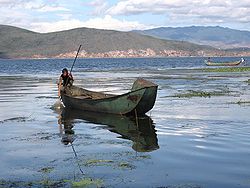Erhai
| Er Lake / Erhai | |
|---|---|
 |
|
| Location | Yunnan |
| Coordinates | 25°45′48″N 100°11′15″E / 25.76333°N 100.18750°ECoordinates: 25°45′48″N 100°11′15″E / 25.76333°N 100.18750°E |
| Basin countries | China |
| Max. length | 40 km (25 mi) |
| Max. width | 8 km (5.0 mi) |
| Surface area | 250 km2 (97 sq mi) |
| Average depth | 11 m (36 ft) |
| Water volume | 2.5 km3 (0.60 cu mi) |
| Surface elevation | 1,972 m (6,470 ft) |
Erhai or Er Lake (Chinese: 洱海; pinyin: Ěrhǎi; literally: "Ear(-shaped) Lake"), is an alpine fault lake in Yunnan province, China. Its name means "Ear-shaped Sea", due to its shape as seen by locals and travellers. Erhai was also known as Yeyuze or Kunming Lake in ancient times.
Erhai is situated at 1,972 metres (6,470 ft) above sea level. In size, the North-South length of the lake is 40 kilometres (25 mi) and the East-West width is roughly 7–8 kilometres (4.3–5.0 mi). Its area is 250 square kilometres (97 sq mi), making it the second largest highland lake of China, after Dianchi Lake. Its circumference reaches 116 kilometres (72 mi), its average depth is of 11 metres (36 ft) and the total storage capacity of 2.5 billion cubic metres (2,000,000 acre·ft).
The lake serves as a backdrop to all of Dali City and sandwiches Dali Town in the west against the Cang Mountain. The lake's head is at Shangguan Town, its northern extremity, and its southernmost point is at Xiaguan Town. The lake receives water from the Miju and Mici Rivers in the north, the Bolou River in the east, and smallers streams from the Cang Mountains in the west. Yangbi River, to the south, is the lake's outlet and eventually flows into the Lancang River (Mekong River).
The lakeshore can be explored by hiking. Highlights include Erhai Park and the Butterfly Springs on the Western bank. Islands on the lake – including Guanyin Ge, Jinsuo Island (金梭岛; "Golden Shuttle Island"), Nanzhao Folklore Island (南诏风情岛) and Xiaoputuo Island – are also available for visits.
The lake is an important food source for the local people (Bais), who are famous for their fishing method: their trained cormorants catch fish and return them to fishmongers. The birds are prevented from swallowing their fish by rings fixed around their neck.
...
Wikipedia
